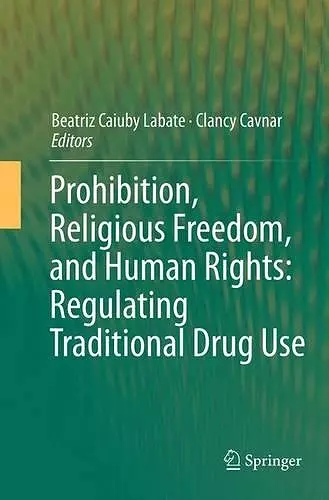Prohibition, Religious Freedom, and Human Rights: Regulating Traditional Drug Use
Beatriz Caiuby Labate editor Clancy Cavnar editor
Format:Paperback
Publisher:Springer-Verlag Berlin and Heidelberg GmbH & Co. KG
Published:23rd Aug '16
Currently unavailable, and unfortunately no date known when it will be back

"The meaning of drugs is changing, with the twentieth-century language of 'drug abuse' and policy of a 'war on drugs' breaking down. Global trade and the internet are eroding the regime of prohibition, and at the same time the resilience and recovery of traditional forms of drug use are pointing towards new strategies for the integration of drug use into modern societies. These vivid portraits of long-established drug cultures and their collisions with the blunt instrument of criminal law expose the contradictions of current drug politics and illuminate the alternatives." (Mike Jay, author, High Society: mind-altering drugs in history and culture) "This informative and much-needed volume has a comparative and international perspective, focusing on the interaction of drug policies with human rights and religious freedom. The book covers controversies from around the world involving peyote, cannabis, ayahuasca, coca leaf, khat, and other drugs. It will be useful not only researchers and scholars in many disciplines, but also policy makers." (James T. Richardson, J.D., Ph.D, Foundation Professor of Sociology and Judicial Studies, University of Nevada, Reno) "This fascinating interdisciplinary collection offers a timely contribution to the increasingly energetic debate on drug policy reform. Its focus on how traditional uses of certain psychotropic substances have become 'controlled' through inclusion within national and United Nations legal frameworks usefully highlights growing tensions between imposed, predominantly 'Western', norms and embedded cultural practices; a dynamic often played out in terms of religious use and human rights. Through examination of a range of substances and contexts, the authors ably demonstrate how a 'one size fits all' approach to dealing with drug consumption frequently generates a range of harms and make a compelling case for 'more reasoned, humane and compassionate drug policies'. A thoughtful and provocative book, Prohibition, Religious Freedom and Human Rights: Regulating Traditional Drug Use deserves widespread attention." (Prof. David R Bewley-Taylor, Director, Global Drug Policy Observatory, Swansea University, UK and author International Drug Control: Consensus Fractured) "This book is essential reading for anyone working at the blind intersection of religion, drugs, and modern culture. I welcome this new publication." (Richard Glen Boire, Attorney, RGB Law Group and co-creator of the term "cognitive liberty.)
By addressing the disputes involved in the regulation of traditional drug use, this volume reflects on notions such as origin, place, authenticity, and tradition, thereby relating drug policy to broader social science debates.
This book addresses the use and regulation of traditional drugs such as peyote, ayahuasca, coca leaf, cannabis, khat and Salvia divinorum. The uses of these substances can often be found at the intersection of diverse areas of life, including politics, medicine, shamanism, religion, aesthetics, knowledge transmission, socialization, and celebration. The collection analyzes how some of these psychoactive plants have been progressively incorporated and regulated in developed Western societies by both national legislation and by the United Nations Drug Conventions. It focuses mainly, but not only, on the debates in court cases around the world involving the claim of religious use and the legal definitions of “religion.” It further touches upon issues of human rights and cognitive liberty as they relate to the consumption of drugs. While this collection emphasizes certain uses of psychoactive substances in different cultures and historical periods, it is also useful for thinking about the consumption of drugs in general in contemporary societies. The cultural and informal controls discussed here represent alternatives to the current merely prohibitionist policies, which are linked to the spread of illicit and violent markets. By addressing the disputes involved in the regulation of traditional drug use, this volume reflects on notions such as origin, place, authenticity, and tradition, thereby relating drug policy to broader social science debates.
ISBN: 9783662510407
Dimensions: unknown
Weight: 4277g
254 pages
Softcover reprint of the original 1st ed. 2014